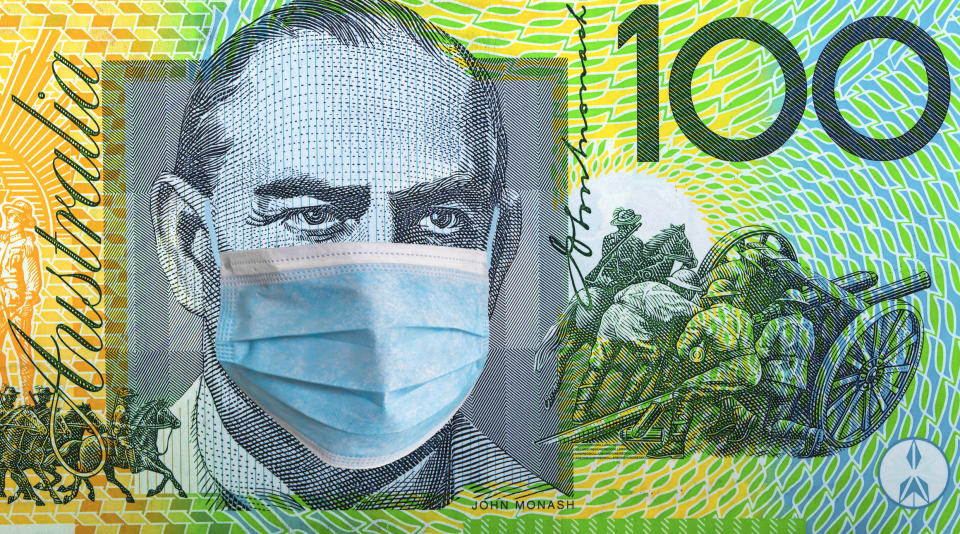'Staggering': The 2020 Covid-19 depression explained

When the Governor of the Reserve Bank of Australia says that official interest rates are likely to remain near 0 per cent for many years, government tax revenue is undershooting forecasts by $20 billion and government spending is $50 billion above the forecast of just a few months ago, even Blind Freddie knows the economy is in huge trouble.
It is staggering and utterly dispiriting to see around 25 per cent of the workforce either unemployed, underemployment or having given up looking for work.
Those lucky to have a job are being subjected to pay freezes or pay cuts and many are on edge fearing their job will be the next to go.
Having stabilised after the early year slump, stock markets now look to be in big trouble as Covid-19 spreads around the world and policy makers flounder in their support for the economy.
More from The Kouk: The 2020 Covid-19 Depression has hit the jobs market
More from The Kouk: Huge changes expected in coronavirus recovery
More from The Kouk: House prices continue to rise – predictions of a 35% fall are in the bin
In Australia, house prices are now falling. Not precipitously, but falling nonetheless as demand disappears from the closing of the borders and immigration cascades towards zero.
According to Treasury, in the 1930s Great Depression the unemployment rate peaked at just under 20 per cent. Wages fell, prices fell and government policy makers erred in keeping economic policy too tight for too long.
Does that look familiar?
What we are seeing now, here in 2020, is probably not a recession, it’s probably a depression.
October could be a disaster
Much has been written about how the JobKeeper program will be scaled back at the end of September and the JobSeeker payment will be cut.
The government says it is working on policies to help in the transition from these stimulatory measures, but it is obvious the amount of money going into the economy from government measures will be substantially smaller in the December quarter than in the September quarter.
That is just part of the problem.
In most States and Territories, the end of September will see the ‘no eviction’ policy end for renters of residential property.
The ‘no eviction’ rule was, alas, a half-baked response to the fact that people could not pay their rent whilst unemployed or wage less. That landlords, who were given a ‘mortgage holiday’ from their banks would keep their head above water and not have to kick people out.
When the ‘no evictions’ policy ends, it is probable that there will be a surge in people being evicted for not paying their rent and landlords potentially being driven to forced property sales to get themselves out of their financial difficulties.
The human tragedy is obvious.
The impact on consumer confidence will be sharp and negative.
The economy will also be hit by the ending of the ‘mortgage holiday’ – that is the decision of the banks to allow borrowers to defer making their monthly repayments on their mortgage. While repayments were postponed, debt was being accumulated.
When the repayment holiday ends, many borrowers will need to find many thousands of dollars a month to resume their repayment schedule, a task that for some will be impossible given they will be unemployed, their businesses have closed or their incomes have dropped.
What is an economic depression?
In one way, the label of ‘recession’ or ‘depression’ doesn’t matter much.
If you can’t find work, your business has closed, you are forced to sell your house, your wage is frozen or cut, interest rates are near zero and the budget deficit is exploding, it is bad news whatever the label attached to the situation.
There is no simple definition of what an economic depression is. Thankfully, they are not all that common which makes the task of defining one open to debate.
Most definitions focus on a large fall in economic output (GDP), that there is an extended period before the economy regains the lost output, the labour market has chronically high underutilisation and there is price and wage disinflation or deflation.
While the hard data on many of those variables has yet to be collated and published, the information that is available suggests that most of the boxes defining a recession have a tentative tick. The only point of debate is the duration of the current economic malaise.
Will it be just 6 months of economic pain?
12 months?
Or will we have several years where economic growth waxes and wanes at a low level of activity, where the labour market is characterised by high unemployment, underemployment and a low participation rate, when wages growth and inflation is weak?
The jury is out on that and of course, time will tell.
But for now, it seems a safe assumption to make that the economy will be in severe trouble through to the end of 2020, at least.
Will what we are seeing be labelled the 2020 COVID Depression?
It seems, unfortunately, there is a good chance of that.
Are you a millennial or Gen Z-er interested in joining a community where you can learn how to take control of your money? Join us at The Broke Millennials Club on Facebook!

 Yahoo Finance
Yahoo Finance 
